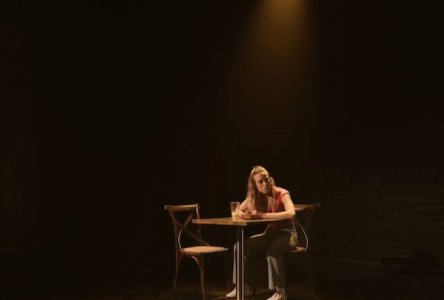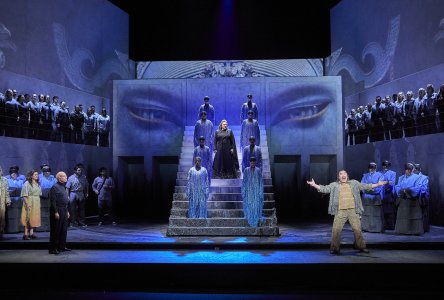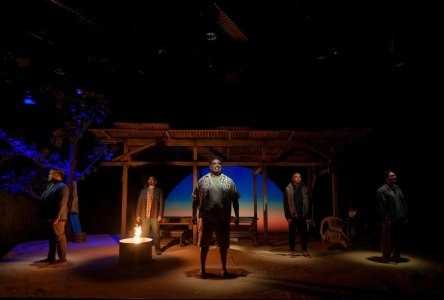
THE SUGAR HOUSE
THE SUGAR HOUSE, Upstairs Theatre at Belvoir, 9 May-3 June 2018. Photography by Brett Boardman: above - Sacha Horler, Sheridan Harbridge and Kris McQuade; below - Lex Marinos, Josh McConville, McQuade and Nikki Shiels; below again - Harbridge and McConville
This new play by Alana Valentine is a kind of biography – in microcosm – of Sydney. And its depiction of the formerly working class, industrial suburb of Pyrmont and three generations of one of its families is as credible, tough and romantic as a Dickens saga.
The Macreadies live in the shadow and pong of the CSR factory (Colonial Sugar Refining Company) where Sidney (Lex Marinos) is a turner and fitter. At home, June, his wife and the family matriarch (Kris McQuade), is as tough as the sandstone that was another Pyrmont industry. Like the rock, her true qualities are well disguised and few can see or chisel them out.
Emotionally battered by a lifetime of being overlooked by her mother is Margo (Sacha Horler). Her fragile sense of herself is also blighted by June’s favouring of son Ollie (Josh McConville) who can do no wrong, even when he falls in with a mob of crims and becomes the focus of attention for Pyrmont’s crooked cops. Watching – and in the opening scene remembering – all this is Margo’s daughter Narelle, a preternaturally bright eight-year-old (Sheridan Harbridge), the apple of her grandmother’s eye.
Alana Valentine is best known for plays that take off from a factual basis into drama and the unknown – Letters to Lindy, Parramatta Girls, Barbara and the Camp Dogs, Run Rabbit Run – and The Sugar House is a similar mix, although fiction plays a greater part in the characters, while the history and social mores of Pyrmont are the backdrop.
Early in the piece it becomes clear that June’s unrelenting suspicion and toughness towards any possible danger to her family is borne out of a childhood as the only girl in a Balmain family of eight petty criminal brothers. When she realises foolish Ollie has got himself into the clutches of Lenny McPherson, her fear arises from that background.
Anyone who’s read their Sydney criminal history or watched Underbelly will also recognise McPherson: a major malefactor whose career began as a child thief in a family of ten siblings and went on to sly grog, extortion, bribery, gang wars and murder, all the while cultivating corrupt cops and politicians. It’s to one of the latter June turns to help her son. She visits “Mr Sheahan” (Marinos), who sounds remarkably like the real life Tom Sheehan, Member for Cook and unfortunately, also in real life, one of McPherson’s little mates.

It’s at this point that class is vividly brought to the fore in The Sugar House. June is a woman who, with an education and opportunities, could have taken on the world. Instead this strong, capable woman virtually kowtows to the politician and is pathetically grateful for the scraps of consolation he throws her way. Although located in old Pyrmont, the exchange is rooted in the imported social muck of Mother England – an old-time East Ender would instantly recognise and spit on it.
Recognisable too is June’s yearning for her grand daughter to achieve a place in the sun. Born just too soon to be upwardly mobile and escape her roots and its expectations, Margo is done for even before she starts on a series of no-hoper hubbies. So it’s Narelle on whom June concentrates her attention and determination (actually love, but she could never admit it).
June doesn’t take into account, however, the 21st century sense of entitlement, uppity wilfulness and political vision that the changing city has given the smart young woman. The clash of the ages and social positions is cataclysmic.
Gifted with the thrilling trio of McQuade, Horler and Harbridge, Goodes propels the play forward in three distinct time periods – 1967, 1985 and 2007 – in scenes that range from comical to wry to shocking and finally, to tragedy. The setting (Michael Hankin) is a chic industrial interior – all cream-painted brick, huge paned windows and artfully incorporated “original” beams and pillars. The lighting (Damien Cooper) also enables the imagination to see the grimy, gloomy sugar factory as well as the poor Macreadie home. Rapid changes of place, time and character are facilitated with a booming soundtrack (Steve Francis) and period costumes (Emma Vine).
When Narelle (now the self-styled Nell, if you please) is shown the penthouse apartment by yaaah-dahling real estate agent Prin (Nikki Shiels) in the opening moments, the past is also the future. Nell is hurting at the memories of what she has lost in gaining the keys to this place. It’s a brutal story – as we see over the play’s two and half hours (including interval).
The CSR plant is now the very liveable Jackson’s Landing (“who was Jackson? I guess he must have landed here,” say Narelle/Nell, teasing clueless Prin). And it’s likely its new inhabitants wouldn’t have a clue about plague, rickets or mother’s ruin. It’s a classic metaphor for so much of Sydney where the past has either been bulldozed, cut down or remade while its earlier inhabitants die or are moved on.

The Sugar House is blessed with a brilliantly nuanced, powerful and intelligent performance from Kris McQuade – a reminder that she is so much more than her popular TV characters. Sacha Horler is equally outstanding as the tragic misfit Margo and she takes this multi-faceted character on a tremendous journey culminating in a speech that leaves her mother and the audience speechless.
As Narelle who will be Nell, Sheridan Harbridge is a convincing charming bratty kid who metamorphoses over time into a much less charming and equally convincing bratty student lawyer. It’s not an easy transformation and Harbridge is at ease with Narelle at all her stages.
Nikki Shiels too makes a startling transformation from the twit real estate agent, to Ollie’s pneumatic girlfriend who becomes his earnestly bespectacled wife: faithful and evidently the backbone he lacks when he emerges from jail. Josh McConville is, of course, the charmer Ollie and he manages the fine line between needing to be either slapped or punched out as he belatedly grows up. He also cameos as a tattooist who is dubious about Nell’s choice of tatt in a scene of heavenly comedy. And Lex Marinos has the generally thankless task of being variously the dad, the pollie and the corrupt cop and is a solid presence.
In its premier season, The Sugar House was, on opening night, a bit rough around the edges, but nothing that a few shows won’t smooth out. It’s also in need of a trim and tighten and a decision to be made about which ending to go with. The songs could be on the cutting list, please, they’re molasses in an otherwise un-sugary house. Recommended.



